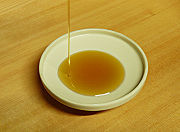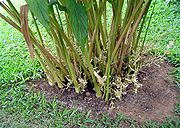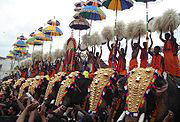Ayurveda (the 'science of life') is a system of traditional medicine native to India, and practiced in other parts of the world as a form of alternative medicine. In Sanskrit, the word Ayurveda comprises the words āyus, meaning 'life' and veda, meaning 'science'. Evolving throughout its history, Ayurveda remains an influential system of medicine in South Asia. The earliest literature of Ayurveda appeared during the Vedic period in India. The Sushruta Samhita and the Charaka Samhita were influential works on traditional medicine during this era. Ayurvedic practitioners also claim to have identified a number of medicinal preparations and surgical procedures for curing various ailments and diseases.
Ayurveda is considered to be a form of complementary and alternative medicine (CAM) within the western world, where several of its methods—such as herbs, massage, and Yoga as exercise or alternative medicine—are applied on their own as a form of CAM treatment.
Ayurveda believes in 'five great elements' (earth, water, fire, air and space) forming the universe, including the human body. Chyle, Blood, flesh, fat, bone, marrow, and semen are believed to be the seven primary constituent elements of the body. Ayurveda stresses a balance of three substances: wind/spirit/air, phlegm, and bile, each representing divine forces. According to Ayurvedic beliefs, the doctrine of these three Doshas vata (wind/spirit/air), pitta (bile) and kapha (phlegm) is important. Traditional beliefs hold that humans possess a unique constellation of Doshas. In Ayurveda, the human body has 20 Guna (meaning quality). Surgery and surgical instruments are employed. It is believed that building a healthy metabolic system, attaining good digestion, and proper excretion leads to vitality. Ayurveda also focuses on exercise, yoga, meditation, and massage.
 For diagnosis the patient is to be questioned and all five senses are to be employed. The Charaka Samhita recommends a tenfold examination of the patient. The qualities to be judged are: constitution, abnormality, essence, stability, body measurements, diet suitability, psychic strength, digestive capacity, physical fitness and age. Hearing is used to observe the condition of breathing and speech. The study of the vital pressure points or marma is of special importance. Chopra (2003) identifies five influential criteria for diagnosis: 'origin of the disease, prodrominal (precursory) symptoms, typical symptoms of the fully developed disease, observing the effect of therapeutic procedures, and the pathological process.' For diagnosis the patient is to be questioned and all five senses are to be employed. The Charaka Samhita recommends a tenfold examination of the patient. The qualities to be judged are: constitution, abnormality, essence, stability, body measurements, diet suitability, psychic strength, digestive capacity, physical fitness and age. Hearing is used to observe the condition of breathing and speech. The study of the vital pressure points or marma is of special importance. Chopra (2003) identifies five influential criteria for diagnosis: 'origin of the disease, prodrominal (precursory) symptoms, typical symptoms of the fully developed disease, observing the effect of therapeutic procedures, and the pathological process.'  Hygiene - also a component of religious virtue to many Indians - is a strong belief. Hygienic living involves regular bathing, cleansing of teeth, skin care, and eye washing. Occasional anointing of the body with oil is also prescribed. Ayurveda stresses the use of vegetable drugs. Fats are used both for consumption and for external use. Hundreds of vegetable drugs are employed, including cardamom and cinnamon. Some animal products may also be used, for example milk, bones, and gallstones etc. Minerals including sulfur, arsenic, lead, copper sulfate, gold are also consumed as prescribed. Hygiene - also a component of religious virtue to many Indians - is a strong belief. Hygienic living involves regular bathing, cleansing of teeth, skin care, and eye washing. Occasional anointing of the body with oil is also prescribed. Ayurveda stresses the use of vegetable drugs. Fats are used both for consumption and for external use. Hundreds of vegetable drugs are employed, including cardamom and cinnamon. Some animal products may also be used, for example milk, bones, and gallstones etc. Minerals including sulfur, arsenic, lead, copper sulfate, gold are also consumed as prescribed.
|

 For diagnosis the patient is to be questioned and all five senses are to be employed. The Charaka Samhita recommends a tenfold examination of the patient. The qualities to be judged are: constitution, abnormality, essence, stability, body measurements, diet suitability, psychic strength, digestive capacity, physical fitness and age. Hearing is used to observe the condition of breathing and speech. The study of the vital pressure points or marma is of special importance. Chopra (2003) identifies five influential criteria for diagnosis: 'origin of the disease, prodrominal (precursory) symptoms, typical symptoms of the fully developed disease, observing the effect of therapeutic procedures, and the pathological process.'
For diagnosis the patient is to be questioned and all five senses are to be employed. The Charaka Samhita recommends a tenfold examination of the patient. The qualities to be judged are: constitution, abnormality, essence, stability, body measurements, diet suitability, psychic strength, digestive capacity, physical fitness and age. Hearing is used to observe the condition of breathing and speech. The study of the vital pressure points or marma is of special importance. Chopra (2003) identifies five influential criteria for diagnosis: 'origin of the disease, prodrominal (precursory) symptoms, typical symptoms of the fully developed disease, observing the effect of therapeutic procedures, and the pathological process.'  Hygiene - also a component of religious virtue to many Indians - is a strong belief. Hygienic living involves regular bathing, cleansing of teeth, skin care, and eye washing. Occasional anointing of the body with oil is also prescribed. Ayurveda stresses the use of vegetable drugs. Fats are used both for consumption and for external use. Hundreds of vegetable drugs are employed, including cardamom and cinnamon. Some animal products may also be used, for example milk, bones, and gallstones etc. Minerals including sulfur, arsenic, lead, copper sulfate, gold are also consumed as prescribed.
Hygiene - also a component of religious virtue to many Indians - is a strong belief. Hygienic living involves regular bathing, cleansing of teeth, skin care, and eye washing. Occasional anointing of the body with oil is also prescribed. Ayurveda stresses the use of vegetable drugs. Fats are used both for consumption and for external use. Hundreds of vegetable drugs are employed, including cardamom and cinnamon. Some animal products may also be used, for example milk, bones, and gallstones etc. Minerals including sulfur, arsenic, lead, copper sulfate, gold are also consumed as prescribed.

